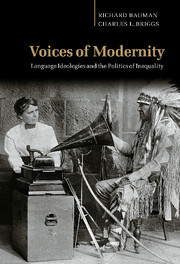Book contents
- Frontmatter
- Contents
- Preface
- 1 Introduction
- 2 Making language and making it safe for science and society: from Francis Bacon to John Locke
- 3 Creating modernity's others in seventeenth- and eighteenth-century England: antiquarian and philological inflections
- 4 The critical foundations of national epic and the rhetoric of authenticity: Hugh Blair and the Ossian controversy
- 5 Language, poetry, and Volk in eighteenth-century Germany: Johann Gottfried Herder's construction of tradition
- 6 Scientizing textual production in the service of the nation: the Brothers Grimm and Germanic philology
- 7 The making of an American textual tradition: Henry Rowe Schoolcraft's Indian researches
- 8 The foundation of all future researches: Franz Boas's cosmopolitan charter for anthropology
- 9 Conclusion
- References
- Index
9 - Conclusion
Published online by Cambridge University Press: 22 September 2009
- Frontmatter
- Contents
- Preface
- 1 Introduction
- 2 Making language and making it safe for science and society: from Francis Bacon to John Locke
- 3 Creating modernity's others in seventeenth- and eighteenth-century England: antiquarian and philological inflections
- 4 The critical foundations of national epic and the rhetoric of authenticity: Hugh Blair and the Ossian controversy
- 5 Language, poetry, and Volk in eighteenth-century Germany: Johann Gottfried Herder's construction of tradition
- 6 Scientizing textual production in the service of the nation: the Brothers Grimm and Germanic philology
- 7 The making of an American textual tradition: Henry Rowe Schoolcraft's Indian researches
- 8 The foundation of all future researches: Franz Boas's cosmopolitan charter for anthropology
- 9 Conclusion
- References
- Index
Summary
We began this book by aligning ourselves with Dipesh Chakrabarty's (1992, 2000) and Partha Chatterjee's (1993) project of “provincializing ‘Europe’,” of exploring how categories and relations tied to particular places and times came to be elevated to the status of universals and then used in representing – and dominating – the rest of the world. Our goal has been to open up a new range of insights regarding how Europe got deprovincialized. We have tried to show that constructions of language (meaning both ideologies of language and metadiscursive regimes) and tradition played a central role in creating the modernist project.
When language becomes the focus for telling the story of modernity we can see clearly that what got deprovincialized was not a set of actually existing social forms, European or otherwise. Locke did not take European views of language or modes of speaking and writing and elevate them to the status of universals. He rather targeted the ways of thinking about language espoused by such advocates of modernity as Bacon and his fellow members of the Royal Society, received discursive practices (associated with the Scholastics), and ways of speaking he attributed to the poor, merchants, and women as the central obstacle to modernity. Locke labeled a broad range of ways that language could be used – expressively, poetically, rhetorically, reflectively, persuasively – as the enemies of conceptual and political order.
- Type
- Chapter
- Information
- Voices of ModernityLanguage Ideologies and the Politics of Inequality, pp. 299 - 321Publisher: Cambridge University PressPrint publication year: 2003

